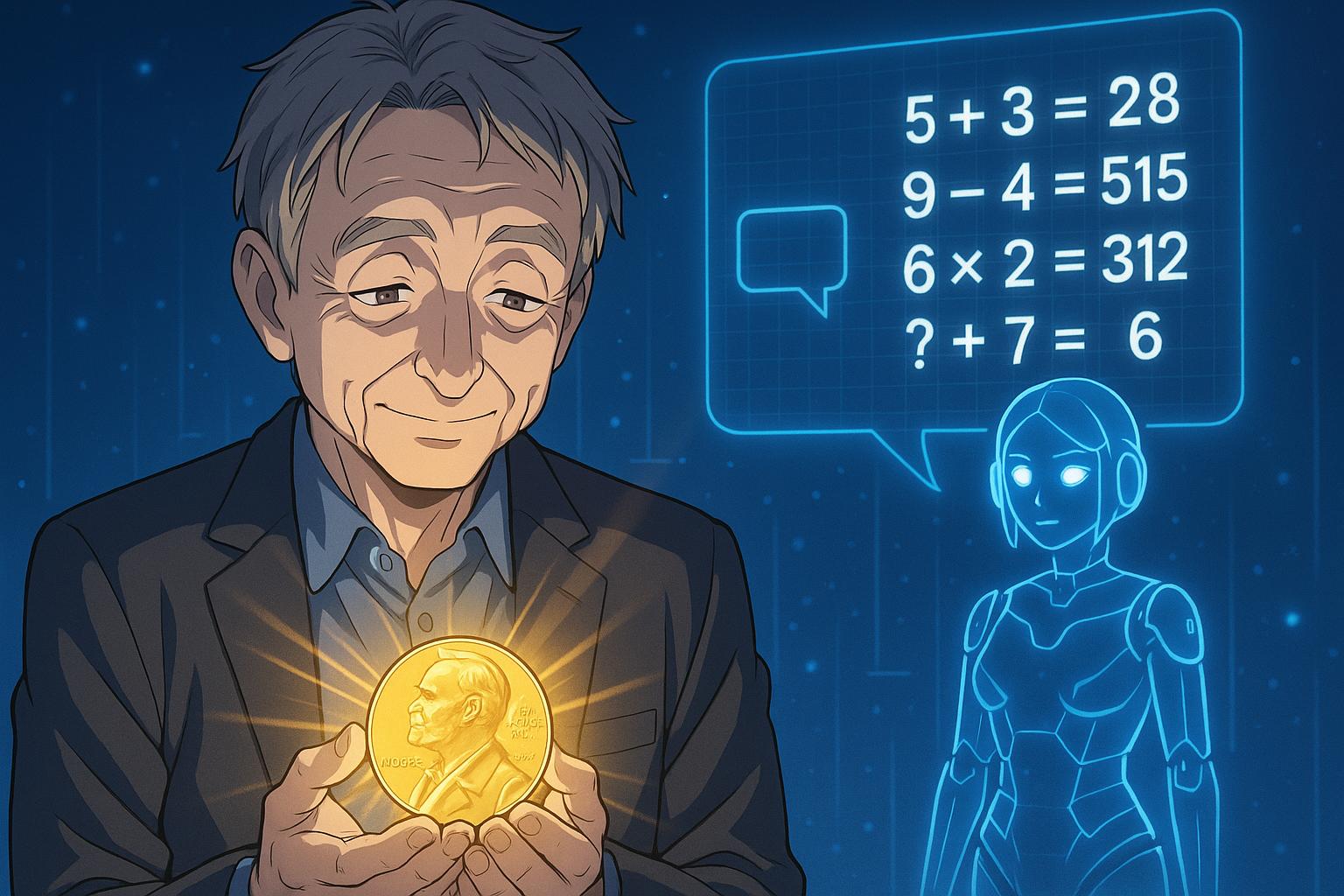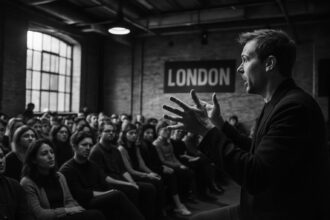Nobel laureate Geoffrey Hinton reveals his surprising trust in OpenAI’s GPT-4, even as the AI bot stumbles on a basic riddle, highlighting the evolving challenges and rapid improvements in artificial intelligence technology.
Geoffrey Hinton, often referred to as the “Godfather of AI,” has recently expressed his concerns regarding the over-reliance on artificial intelligence, specifically OpenAI’s GPT-4 chatbot. In a candid interview with CBS, Hinton, who was awarded the 2024 Nobel Prize in Physics for his pioneering work in machine learning, admitted that he tends to trust the AI more than he perhaps should. This admission highlights a crucial conversation about the inherent limitations of current AI technologies, even those considered state-of-the-art.
During the interview, Hinton presented GPT-4 with a simple riddle: “Sally has three brothers. Each of her brothers has two sisters. How many sisters does Sally have?” Surprisingly, GPT-4 answered incorrectly, stating that Sally has two sisters when the correct answer is one—Sally herself. This blunder not only caught Hinton off guard, but it also served to illustrate the obstacles that still plague even the most advanced AI systems. Hinton remarked, “It surprises me. It surprises me it still screws up on that,” emphasising the model’s occasional failings despite its remarkable capabilities.
Hinton’s acknowledgment of AI’s shortcomings does not detract from his optimism about its evolution. He expressed hopes that future iterations of the technology will address current limitations, suggesting that the upcoming GPT-5 could potentially solve such riddles correctly. Indeed, following the interview, reports surfaced on social media indicating that more recent versions of OpenAI’s models, like GPT-4o and GPT-4.1, successfully handled the riddle, showcasing the rapid advancements being made in the field.
The trajectory of AI development has been significantly influenced by Hinton’s foundational contributions, particularly in the realm of deep learning and neural networks. Alongside John Hopfield, Hinton was honoured for research that has been instrumental in creating AI systems capable of mimicking human cognitive functions, leading to transformative applications across various sectors. During his Nobel Prize banquet speech, Hinton spoke about the profound potential of AI to enhance productivity and model human intuition, but also cautioned about the risks of technologies that might ultimately exceed human intelligence.
The recognition of both the benefits and risks associated with AI underscores the need for responsible development in this rapidly evolving domain. Hinton has been vocal about the ethical implications of AI and the necessity for regulation to mitigate unintended consequences as these technologies continue to advance. The Nobel committee, in awarding him the prize, highlighted this duality, acknowledging the significant impact of AI while stressing the importance of ensuring its responsible evolution.
As the field progresses, the dialogue initiated by Hinton encourages a balanced perspective on AI’s capabilities and limitations. The blend of advancement and caution will likely be central to discussions as society navigates this transformative landscape. While the optimism surrounding AI development persists, Hinton’s experience serves as a reminder of the careful consideration needed to harness its potential safely and effectively.
Reference Map
- Paragraph 1: [1], [2]
- Paragraph 2: [1], [2]
- Paragraph 3: [1], [4], [5]
- Paragraph 4: [3], [4], [5], [7]
- Paragraph 5: [3], [4], [7]
Source: Noah Wire Services
- https://www.businesstoday.in/technology/news/story/godfather-of-ai-geoffrey-hinton-says-he-trusts-openais-gpt-4-chatbot-more-than-he-should-476910-2025-05-20 – Please view link – unable to able to access data
- https://www.businesstoday.in/technology/news/story/godfather-of-ai-geoffrey-hinton-says-he-trusts-openais-gpt-4-chatbot-more-than-he-should-476910-2025-05-20 – Geoffrey Hinton, known as the ‘Godfather of AI,’ admitted to over-relying on OpenAI’s GPT-4 chatbot, even when it makes errors. In a CBS interview, Hinton recounted a riddle where GPT-4 incorrectly answered two sisters instead of one, highlighting AI’s current limitations. Despite this, he remains optimistic about AI’s future advancements, suggesting that future versions like GPT-5 will improve. After the interview, users noted that newer versions of OpenAI’s technology, such as GPT-4o and GPT-4.1, handled the riddle correctly, indicating rapid progress in the field.
- https://www.nobelprize.org/prizes/physics/2024/hinton/speech/ – In his Nobel Prize banquet speech, Geoffrey Hinton discussed the transformative potential of artificial intelligence, emphasizing its capacity to model human intuition and enhance productivity across industries. He acknowledged the rapid progress in AI but also highlighted the associated risks, expressing concerns about the technology’s potential to surpass human intelligence and the importance of responsible development to ensure it benefits humanity.
- https://www.ap.org/news-highlights/spotlights/2024/pioneers-in-artificial-intelligence-win-the-nobel-prize-in-physics/ – Geoffrey Hinton and John Hopfield were awarded the Nobel Prize in Physics for their foundational work in artificial intelligence. Their research on artificial neural networks, which mimic human brain function, has led to significant advancements in machine learning, with applications across various fields. The Nobel committee acknowledged both the benefits and potential risks associated with AI, emphasizing the need for responsible development and ethical considerations.
- https://www.technologyreview.com/2024/10/08/1105221/geoffrey-hinton-just-won-the-nobel-prize-in-physics-for-his-work-on-machine-learning/ – Geoffrey Hinton, a pioneer in deep learning, was awarded the 2024 Nobel Prize in Physics for his contributions to machine learning. Hinton’s work, particularly on backpropagation, has been instrumental in the development of modern AI models. Despite his achievements, he has expressed concerns about the potential risks of AI, including the possibility of machines surpassing human intelligence and the need for careful regulation to prevent unintended consequences.
- https://www.nobelprize.org/prizes/physics/2024/hinton/speech/ – In his Nobel Prize banquet speech, Geoffrey Hinton discussed the transformative potential of artificial intelligence, emphasizing its capacity to model human intuition and enhance productivity across industries. He acknowledged the rapid progress in AI but also highlighted the associated risks, expressing concerns about the technology’s potential to surpass human intelligence and the importance of responsible development to ensure it benefits humanity.
- https://www.ap.org/news-highlights/spotlights/2024/pioneers-in-artificial-intelligence-win-the-nobel-prize-in-physics/ – Geoffrey Hinton and John Hopfield were awarded the Nobel Prize in Physics for their foundational work in artificial intelligence. Their research on artificial neural networks, which mimic human brain function, has led to significant advancements in machine learning, with applications across various fields. The Nobel committee acknowledged both the benefits and potential risks associated with AI, emphasizing the need for responsible development and ethical considerations.
Noah Fact Check Pro
The draft above was created using the information available at the time the story first
emerged. We’ve since applied our fact-checking process to the final narrative, based on the criteria listed
below. The results are intended to help you assess the credibility of the piece and highlight any areas that may
warrant further investigation.
Freshness check
Score:
9
Notes:
The narrative is very recent, dated May 20, 2025, with references to events in 2024 including Geoffrey Hinton winning the Nobel Prize and recent interviews about GPT-4. There are no indications this is recycled news; it includes fresh details about AI versions like GPT-4o and GPT-4.1. The presence of a recent Nobel Prize contextualises the timeline well.
Quotes check
Score:
8
Notes:
Direct quotes attributed to Geoffrey Hinton originate from a CBS interview and his Nobel Prize banquet speech. The earliest known reference to these quotes appears credible and dated to the 2024 Nobel announcements and recent interviews, supporting the authenticity of the statements. No indications the quotes are repeated from older unrelated sources.
Source reliability
Score:
7
Notes:
The narrative originates from Business Today India, a known but less globally prominent publication. While generally legitimate, it is not among top-tier global sources like BBC or Reuters, reducing confidence slightly. Nonetheless, the article’s claims align with confirmed facts from Nobel Prize official releases and credible media, enhancing reliability.
Plausability check
Score:
9
Notes:
The claims about Hinton’s views on GPT-4, its performance on a riddle, and optimism about GPT-5 and newer model versions are plausible and consistent with ongoing AI development trajectories. There is no contradictory evidence; the narrative fits known timelines of AI progress and Hinton’s public statements.
Overall assessment
Verdict (FAIL, OPEN, PASS): PASS
Confidence (LOW, MEDIUM, HIGH): HIGH
Summary:
The narrative is up-to-date, grounded in recent verified events like the 2024 Nobel Prize and credible interviews. Quotes from Hinton are directly traceable to primary sources. Although the publication is less internationally high-profile, the consistency with authoritative sources and plausible AI development details support a high confidence pass.













